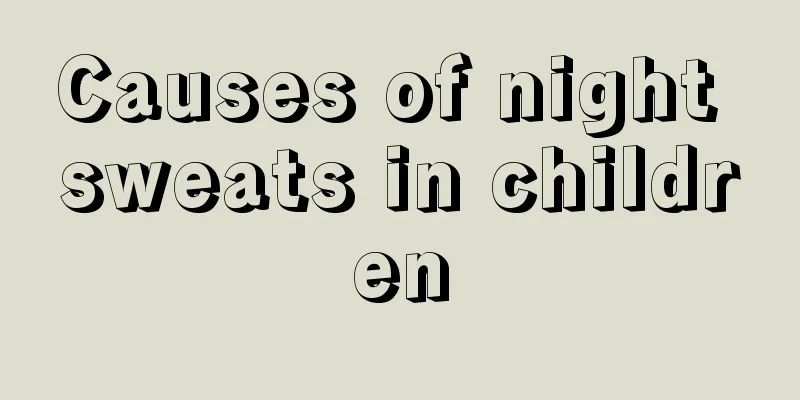What to do with neonatal eczema

|
Many newborns have eczema, so what is neonatal eczema? What to do about neonatal eczema? I believe that these are questions that many mothers would like to know. The following article will introduce you to the relevant knowledge about neonatal eczema. Friends who want to know what to do with neonatal eczema can continue reading! Please see the detailed introduction below. Neonatal eczema, commonly known as milk ringworm, is a common allergic skin inflammation caused by internal and external factors. The skin lesions are polymorphic lesions mainly composed of papules and herpes, with a tendency to exudate, recurrent attacks, overlapping acute and chronic phases, accompanied by severe itching, and the cause is often difficult to determine. Neonatal eczema is related to a variety of internal and external factors, and it is sometimes difficult to determine the specific cause. The ingestion of food allergens through the digestive tract, such as fish, shrimp, beef, mutton, eggs and other allergenic factors, can cause type I allergic reactions in the body. In addition, mechanical friction, such as frequent stimulation from saliva and milk overflow, is also a cause of this disease. Improper care, such as excessive use of strong alkaline soaps, excessive nutrition, and abnormal intestinal digestion can also cause this disease. Certain external factors, such as sunlight, ultraviolet rays, cold, humidity and heat, contact with silk or artificial fibers, topical medications, and bacterial skin infections can cause eczema or aggravate its condition. What to do if your baby has eczema? What are the treatments for neonatal eczema? 1. Diet management It is best to find and avoid the allergen. Children who are allergic to milk protein should switch to amino acid formula powder or extensively hydrolyzed protein formula powder. 2. Local treatment Children should take a bath every day to keep their skin clean and moisturized, but the water temperature should not be too high and chemical bath products should be used as little as possible. For exudative and dry eczema, if there is no ulceration on the surface, the child should be given some non-allergic moisturizing cream to play a moisturizing role. For severe eczema, topical corticosteroid cream can be applied short-term, which has obvious anti-inflammatory and antipruritic effects. Be careful to avoid long-term and high-dose application to avoid side effects. If the local ulcer is infected, antibiotic ointment needs to be applied locally for anti-inflammatory treatment. 3. Oral antihistamines Antihistamines such as chlorpheniramine and zolpidem can be taken orally under the guidance of a doctor. 4. Systemic corticosteroids Whether taken orally or intravenously, corticosteroids can quickly control symptoms, but they are prone to relapse after discontinuation and cannot be cured. Long-term use can cause dependence and various adverse reactions, so they should be used with caution as appropriate. For patients with generalized acute eczema who do not respond well to other treatments, oral prednisone can be taken for a short period of time and the dosage can be gradually reduced after the condition improves. The above is an introduction on what to do about neonatal eczema. I believe that after reading the above introduction, you will have some understanding of the treatment methods of neonatal eczema. Then, when a child develops eczema, you can follow the methods introduced above to prevent and treat neonatal eczema. Of course, when a child develops eczema, it is best to see a doctor so that he or she can receive symptomatic treatment! |
<<: What to do if your baby has hernia
>>: What are the causes of dry skin in newborns?
Recommend
2 year old baby walking unsteadily
Children can start practicing walking when they a...
Baby wakes up once an hour at night
Some babies are particularly easy to wake up when...
How to care for children with fractures
Children are usually naughty and run around, and ...
What medicine should children take for frequent urination
Nowadays, many parents find that their children a...
What to do if your child has lower abdominal pain
Children are still immature in development, and o...
0-1 year old baby's visual development process
There is a saying that newborns have no vision. I...
How long does it take for baby's pillow baldness to heal?
We will find that many children have very less ha...
Why do children clench their teeth at night?
Many children also like to clench their teeth whe...
Treatment for neonatal insecurity
The lack of security in newborns often makes our ...
Causes of Nosebleeds
Nosebleed, also known as epistaxis, is a problem ...
What is the most suitable room temperature for a newborn baby to bathe?
Bathing a newborn is an important time for mother...
What oil is best for one-year-old babies?
In the first few months after the baby is born, b...
What should I do if my three-year-old baby has astigmatism?
The baby's eyesight is very important. It is ...
What's going on when a child complains of dizziness?
The physical health of children during their grow...
What to do after a child's skin is sunburned
In the summer, the temperature is particularly hi...









